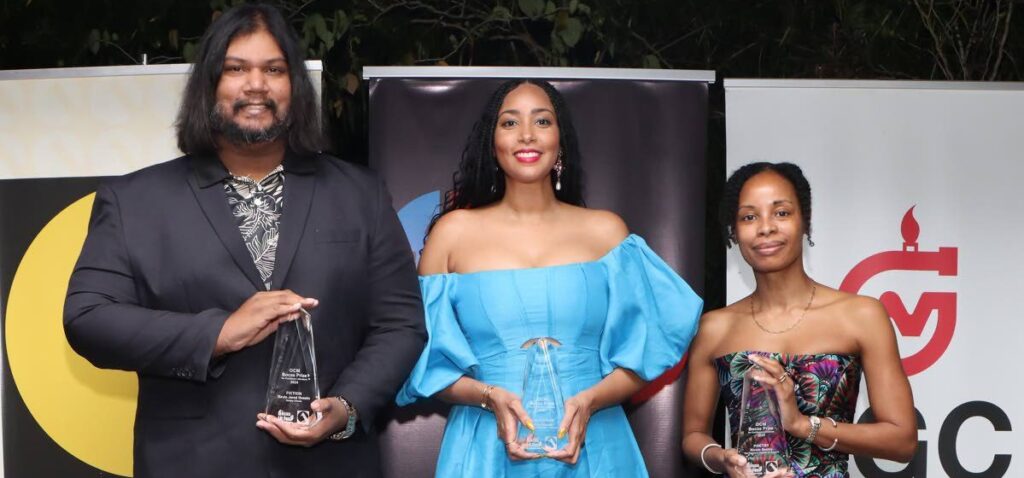Jamaican author wins OCM Bocas prize for literature

Winner of the OCM Bocas Prize Jamaican author Safiya Sinclair said she was shocked at the announcement.
Her book How to Say Babylon: A Memoir won the overall 2024 OCM Bocas Prize for Caribbean Literature, which comes with a cash award of US$10,000, sponsored by One Caribbean Media.
Speaking at the award ceremony on Saturday at Esperenza Alta, St Ann's, Sinclair said she wrote the book for Caribbean women, and in hopes her father would hear her.
“Everything I write and feel and dream is for the Caribbean. I wrote How to Say Babylon for all the Caribbean women whose work and deeds so often go unseen and unsung, women who are overlooked and forgotten in the margins of history. I wrote this book for all the Caribbean who gave us the wildfire of our dialects and our folklore.
“In many ways too, I wrote this book for my father and the rest of bredren like him who gave me the fire of my linguistic rebellion, to say what the I mean and mean what the I say. I wrote this in hopes that my father may understand me a little bit better, that he might finally hear me."
She said she also wrote the book for her siblings and in tribute to the place she grew up in.
“I wrote this book for my siblings, my sisters Ife and Shari, and my brother Lij. Im so thankful for their strength, their laughter, their hope, the sunlight we found somehow, somewhere, under the shadow of our circumstance.
“And I wrote this book for Montego Bay, Jamaica, the red poinciana I was born under, the blue sound and music of my Caribbean sea.”
She congratulated her fellow competitors, Kevin Jared Hosein, who won the fiction category with his book Hungry Ghosts, and Nicole Sealey, who won the poetry prize for The Ferguson Report: An Erasure.
She said she was thankful for the inspiration of writers who came before her, including Edwidge Danticat, Lorraine Goodison, Sylvia Wynter, Jamaica Kincaid, Dionne Brand, Canisia Lubrin, Nicole Sealey and others.
“With you, with all of you, we continue to create this matriarchal language, and with you I'm leaving my small part of work.”
Sinclair had a message for her fellow Caribbean writers.
“I want to say, being born in someone else else's idea of paradise, we're often encouraged not to dream too far, not to think too big. But I think the very essence of being Caribbean is that when we're told what's impossible, we still reach for the sun anyway.
“I wrote this book for all of you, for home. I write in hope we continue to defy colonial powers and continue to interrogate the violent history of the narratives that we were handed.”
She said she wanted an end to colonial violence worldwide.
“I wish to see an end to the horrific genocide in Gaza. I dream to see a free Palestine in my lifetime, a free Congo, a free Sudan, a free Haiti."
Sinclair spoke about how colonial violence shaped the Caribbean.
“When Columbus came to this archipelago, he miscategorised the West Indies. He also mischaracterised the natives he found there as Caribes, cannibals, and perhaps there is some sense this is what we are as Caribbean, ferocious in our survival, because we fight for our land, our life and our selfhood. Every freedom song is ours, forged in the wail of history.”
Finally, Sinclair thanked her mother for shaping her.
“Thank you for igniting the fire of poetry in me, for paving the way to make all of this possible. Thank you for showing me how to read the sea like a poem. It was you who first taught me that as long as I knew the memory of the waves, I could never be lost. As long as I listened to the voice of the seas, I would always find my way back home. And like Walcott said, I write the sea because the sea is history.”
Acclaimed Haitian-American author Edwidge Danticat was chief judge, aided by St Lucian poet Canisia Lubrin, Trinidad-born novelist Rabindranath Maharaj and Guyana-born academic D Alissa Trotz.
In their formal citation, the judges said How to Say Babylon “is a memoir that reminds us of the expansive possibilities of creative nonfiction, bringing to the fore, with unforgettable poetic verve, a voice that is fierce, courageous, deeply intelligent, and empathetic, its nerve endings vibrating out from a specific experience of Rastafarianism into the currents of the wider world.
“Embodying the finest traditions within Caribbean writing, yet standing on its own as a unique and astonishing work of witness, this is a work of reparation attending to both uneasy colonial legacies and difficult contemporary departures.”
Google Books said, “How to Say Babylon is the stunning story of the author’s struggle to break free of her rigid Rastafarian upbringing, ruled by her father’s strict patriarchal views and repressive control of her childhood, to find her own voice as a woman and poet.”
It is only the second time in the 14-year history of the prize that a nonfiction book has won the overall award. Sinclair won the OCM Bocas Prize for poetry in 2017 with her debut book Cannibal.


Comments
"Jamaican author wins OCM Bocas prize for literature"